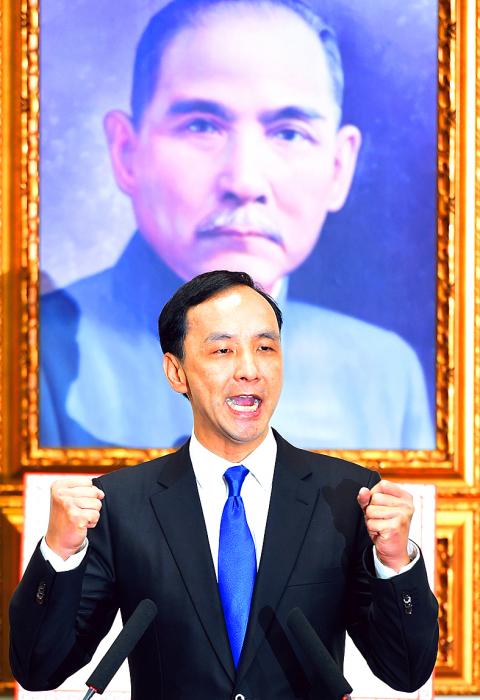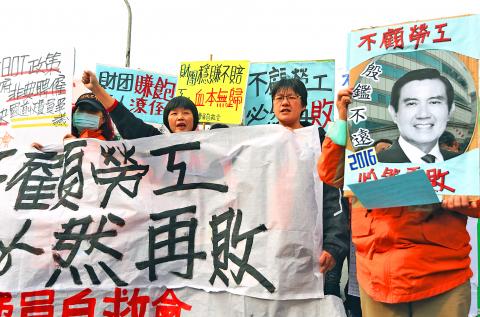Chinese Nationalist Party (KMT) Chairman Eric Chu (朱立倫) yesterday vowed to review the “impact of fast-paced cross-strait exchanges” and the “doubts” over the uneven distribution of benefits generated by cross-strait economic interaction, while adding that China should also face up to the problems.
The New Taipei City mayor made the remarks after he was inaugurated as party chairman, saying the problems were “undisputed.”
The principles the party’s cross-strait policies have been based on since it regained power in 2008, “peaceful development,” “mutual benefit” and “a win-win relationship” have guided cross-strait relations in the right direction, Chu said.

Photo: Chang Chia-ming, Taipei Times
“However, it is undisputed that the fast pace of exchanges in which both sides have engaged in close and intensive interaction have brought psychological impacts to us, because there is a very big difference between Taiwanese society and that [in China],” Chu said.
Chu added that cross-strait economic exchanges have raised concerns over whether the benefits generated have been shared fairly and equitably by the public and “we have to solemnly face up to those doubts.”
The KMT would thoroughly review the two issues and would put them up for discussion, with both sides having the chance to exchange views, Chu said.

Photo: Chien Jung-fong, Taipei Times
Chu urged authorities “on the other side of the strait” to look squarely at the issues as well because it takes both sides working together to maintain a “steady” pace in cross-strait relations and make the relationship sustainable.
During the speech, Chu reiterated his willingness to sit down with the opposition parties and push for the reforms needed to implement a constitutional system under which officials assume responsibility commensurate with their authority and discuss bills concerning issues related to livelihood to foster fairness and justice.
Chu also pledged to make the executive and legislative branches of government work in tandem to facilitate the implementation of policy and to open the party to the younger generation by recruiting more talented young people.
However, Chu made no mention of the party’s assets, although he had said during his campaign that all the party’s ill-gotten assets should be returned to the nation.
President Ma Ying-jeou (馬英九), who resigned as chairman following the party’s rout in the Nov. 29 elections last year, was one of the guests attending the ceremony.
The KMT was equipped with seven vice chairpersons under Ma’s leadership, including Chu.
Chu said he would retain former Taipei mayor Hau Lung-bin (郝龍斌) and former Chiayi mayor Huang Min-hui (黃敏惠) as vice chairpersons.
Vice President Wu Den-yih (吳敦義), former KMT secretary-general Tseng Yung-chuan (曾永權), Deputy Legislative Speaker Hung Hsiu-chu (洪秀柱) and former Greater Taichung mayor Jason Hu (胡志強) would not be reappointed, he said.
Executive Yuan Secretary-General Lee Shu-chuan (李四川) would be appointed secretary-general of the party, he said.
Lee, who worked for the Taipei City Government when Ma was mayor and Chu’s New Taipei City administration, is expected to play a major role in synchronizing the party, the executive and the legislative branches of government.
KMT Legislator Lai Shyh-bao (賴士葆) was appointed to replace KMT Legislator Alex Fai (費鴻泰) as chief of the policy committee.

MAKING WAVES: China’s maritime militia could become a nontraditional threat in war, clogging up shipping lanes to prevent US or Japanese intervention, a report said About 1,900 Chinese ships flying flags of convenience and fishing vessels that participated in China’s military exercises around Taiwan last month and in January last year have been listed for monitoring, Coast Guard Administration (CGA) Deputy Director-General Hsieh Ching-chin (謝慶欽) said yesterday. Following amendments to the Commercial Port Act (商港法) and the Law of Ships (船舶法) last month, the CGA can designate possible berthing areas or deny ports of call for vessels suspected of loitering around areas where undersea cables can be accessed, Oceans Affairs Council Minister Kuan Bi-ling (管碧玲) said. The list of suspected ships, originally 300, had risen to about

DAREDEVIL: Honnold said it had always been a dream of his to climb Taipei 101, while a Netflix producer said the skyscraper was ‘a real icon of this country’ US climber Alex Honnold yesterday took on Taiwan’s tallest building, becoming the first person to scale Taipei 101 without a rope, harness or safety net. Hundreds of spectators gathered at the base of the 101-story skyscraper to watch Honnold, 40, embark on his daredevil feat, which was also broadcast live on Netflix. Dressed in a red T-shirt and yellow custom-made climbing shoes, Honnold swiftly moved up the southeast face of the glass and steel building. At one point, he stepped onto a platform midway up to wave down at fans and onlookers who were taking photos. People watching from inside

Japan’s strategic alliance with the US would collapse if Tokyo were to turn away from a conflict in Taiwan, Japanese Prime Minister Sanae Takaichi said yesterday, but distanced herself from previous comments that suggested a possible military response in such an event. Takaichi expressed her latest views on a nationally broadcast TV program late on Monday, where an opposition party leader criticized her for igniting tensions with China with the earlier remarks. Ties between Japan and China have sunk to the worst level in years after Takaichi said in November that a hypothetical Chinese attack on Taiwan could bring about a Japanese

The WHO ignored early COVID-19 warnings from Taiwan, US Deputy Secretary of Health and Human Services Jim O’Neill said on Friday, as part of justification for Washington withdrawing from the global health body. US Secretary of State Marco Rubio on Thursday said that the US was pulling out of the UN agency, as it failed to fulfill its responsibilities during the COVID-19 pandemic. The WHO “ignored early COVID warnings from Taiwan in 2019 by pretending Taiwan did not exist, O’Neill wrote on X on Friday, Taiwan time. “It ignored rigorous science and promoted lockdowns.” The US will “continue international coordination on infectious